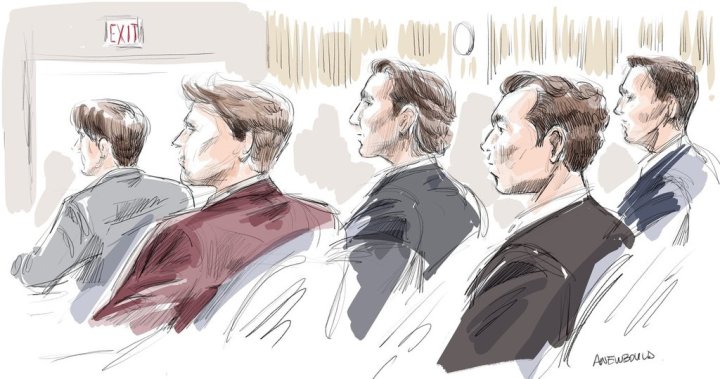As the junior hockey sexual assault trial involving five former World Junior players enters its final stretch, tensions run high both inside and outside the London courthouse. Having followed this case since day one, I can tell you the atmosphere grows heavier with each passing session.
The trial, which began back in April, has captured national attention as five former hockey players face charges related to an alleged sexual assault that occurred following a Hockey Canada gala in 2018. The incident, which allegedly took place at a downtown London hotel room, has forced Canadians to confront difficult questions about sports culture, consent, and accountability.
During my coverage of these proceedings, I’ve watched as both the prosecution and defense methodically presented their cases. The Crown wrapped up its evidence presentation last week, with the defense expected to conclude shortly. Final arguments are anticipated to begin around June 12, according to court officials I spoke with yesterday.
“This case represents a watershed moment for how we address allegations of sexual misconduct in sports,” said Marnie Simpson, a Toronto-based legal analyst who’s been observing the proceedings. “The outcome will reverberate far beyond hockey.”
What strikes me most while sitting in that courtroom is the stark contrast between the celebratory atmosphere of that 2018 gala and the somber reality of these proceedings. The alleged victim, whose identity remains protected under publication ban, testified earlier in the trial – her testimony proving to be among the most emotionally charged moments I’ve witnessed in my reporting career.
The case initially came to light after Hockey Canada settled a lawsuit related to the alleged incident. Public outrage followed when Canadians learned that a special fund, partially maintained through registration fees paid by youth players across the country, had been used to settle such claims.
That revelation sparked a national reckoning. Federal funding to Hockey Canada was temporarily frozen, major sponsors pulled their support, and the organization’s leadership faced intense scrutiny during parliamentary hearings.
Dr. Jordan Goldstein, sports psychologist and consultant to several Toronto athletic organizations, told me, “Regardless of the verdict, this case has already changed how sporting bodies approach education around consent and appropriate behavior.”
The five accused – Dillon Dubé, Carter Hart, Michael McLeod, Cal Foote, and Alex Formenton – have all pleaded not guilty. Each faces one count of sexual assault, with McLeod facing an additional charge of being a party to the offense.
Outside the courthouse yesterday, I observed small groups of supporters on both sides – some holding signs supporting survivors of sexual assault, others expressing concern about presumption of innocence. The case has clearly touched a nerve in our national consciousness.
Several local sports organizations have already implemented enhanced education programs in response to the controversy. “We’ve completely overhauled how we discuss consent and respectful relationships with our young athletes,” explained Sonia Chen, youth program director at a downtown Toronto hockey association.
The proceedings have also sparked important conversations about the culture surrounding elite sports in Canada. Many have questioned whether the adulation heaped upon young athletes, particularly in hockey, creates environments where accountability becomes secondary to athletic achievement.
As Justice Deborah Austin prepares to hear final arguments next month, legal experts suggest the case will likely hinge on questions of credibility and consent. The trial, being heard by judge alone without a jury, has already featured extensive testimony from the complainant, the accused, and various witnesses present that night.
Whatever the outcome, this case has already forced Canadians to confront uncomfortable realities about our national sport and the systems that surround it. The verdict, expected sometime this summer, will represent just one step in what appears to be a much longer journey toward meaningful cultural change.
As I pack up my notes each day after court, I can’t help but reflect on how this case exemplifies both the progress we’ve made in addressing sexual violence and the significant distance we still have to travel. The hockey world – and indeed Canada as a whole – waits anxiously for what comes next.







